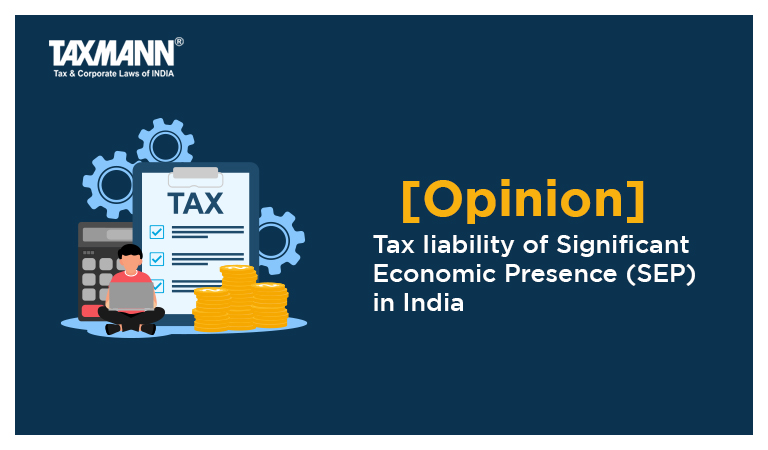[Opinion] Tax liability of Significant Economic Presence (SEP) in India
- Blog|News|Income Tax|
- 3 Min Read
- By Taxmann
- |
- Last Updated on 28 June, 2022

Keshav Yadav & Sharvani Rai – [2022] 139 taxmann.com 517 (Article)
Introduction
India is one of the pro-active nations who dynamically update/alter their taxation laws. Taxation of digital economy is done to levy tax on non-residents deriving income from Indian Markets. In 2018, the Finance Ministry through a notification, levied tax on Significant Economic Presence in India by removing the requirement on having physical Permanent Establishment in India to constitute as a business. In 2016, the government has already through a notification of the Finance Ministry introduced the concept of Equalisation Levy to collect tax from firms like GAFA.
Need for Digital Taxation
In the world that is shifting online for availing newer services every day, it is pertinent that countries analyse this digital presence & start legislating on Digital Taxation in order to catch pace with the world. Listed below are the reasons for the need of digital taxation.
1. The economic model followed till the contemporary world was based on Brick & Mortar system. Consequently, the taxation laws made for the brick & mortar system are outdated in the present world as they were formed decades ago. New dynamic laws that tax digital presence is needed in order to extract tax & reduce loss of revenue to host countries because of their outdated tax laws.
2. The world is moving towards a more integrated & well-connected society. With emergence of 5g bandwidth spectrum, more & more processes will be available online, with this digitized world & economy, the existing tax legislations become superfluous.
3. Companies that work mostly online or through the internet, derive massive profits from other country’s markets, leading to loss of revenue to the host country. This is happening because of absence of uniform taxation laws on significant economic presence. This lapse or loop hole is ripping of taxation by helping such non-residents to evade tax because of absence of permanent establishment in the host country.
4. It is also important that the neo taxation laws focus on the digital economy as a whole & not just e-commerce. This will help in bringing even those entities that have no permanent establishment in the country under the ambit of such act. To counter this, revenue-based taxation shall be adopted.
Steps taken by India to tax Digital Economy
India has always been proactive & dynamic in adopting & amending tax laws. India is one of the first countries in the G-20 to adopt digital taxation. The timeline for the same is as follows:
-
- India introduces Equalisation Levy (google tax) in 2016 at a rate of 6%.
- Equalisation levy aimed to tax non-resident companies providing online advertisement services to Indians.
- In 2018, India introduces taxation of Significant Economic Presence in India.
- In 2018, amendment to Income Tax Act, 1963 was proposed to levy tax on digital entities.
- In July 2020, the scope of Equalisation Levy has been increased to also tax online sale of goods by e-commerce enterprises. (Equalisation Levy 2.0)
- In May 2022, taxation of Significant Economic Presence in India came into effect.
SEP & Its importance in today’s world
Digitalization
Due to the globalisation & digitization in today’s world, there is an increase in international connections which has led to creation of a global digital market ultimately leading to creation of digital economy. Because of this, large-scale transactions take place online at a digital medium without the need for a physical setup in host country. In order to collect tax effectively from these non-residents, strong rules on collection of tax from SEP should be made. Otherwise, they will evade tax by not qualifying as business without a physical permanent establishment.
New nexus role
According to New Nexus Role, taxation should be done based on significant involvement in the market & economy & not on physical presence. This will ensure that no one deriving gains out of a country evade taxation & so that all market players are captured uniformly.
Fair Taxation
SEP also acts as a check mechanism for global taxation as it impacts the tax haven countries which in the past have benefitted by having low-slung or zero taxation & in turn causing loss to countries with fair taxation system.
Click Here To Read The Full Article
Disclaimer: The content/information published on the website is only for general information of the user and shall not be construed as legal advice. While the Taxmann has exercised reasonable efforts to ensure the veracity of information/content published, Taxmann shall be under no liability in any manner whatsoever for incorrect information, if any.

Taxmann Publications has a dedicated in-house Research & Editorial Team. This team consists of a team of Chartered Accountants, Company Secretaries, and Lawyers. This team works under the guidance and supervision of editor-in-chief Mr Rakesh Bhargava.
The Research and Editorial Team is responsible for developing reliable and accurate content for the readers. The team follows the six-sigma approach to achieve the benchmark of zero error in its publications and research platforms. The team ensures that the following publication guidelines are thoroughly followed while developing the content:
- The statutory material is obtained only from the authorized and reliable sources
- All the latest developments in the judicial and legislative fields are covered
- Prepare the analytical write-ups on current, controversial, and important issues to help the readers to understand the concept and its implications
- Every content published by Taxmann is complete, accurate and lucid
- All evidence-based statements are supported with proper reference to Section, Circular No., Notification No. or citations
- The golden rules of grammar, style and consistency are thoroughly followed
- Font and size that’s easy to read and remain consistent across all imprint and digital publications are applied



 CA | CS | CMA
CA | CS | CMA
